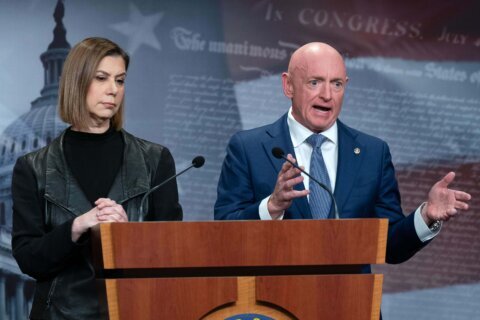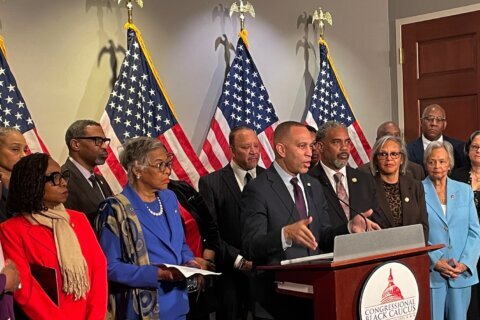Pitched battles over abortion rights and election falsehoods are playing out in attorneys general contests across the nation.
Though the races receive less attention than federal races and contests for governor, 11 competitive races for states’ top prosecutor underscore the crucial roles that attorneys general play in determining their states’ approaches to the enforcement of abortion bans, election restrictions, federal policies and more.
Some Democratic attorneys general, such as Michigan’s Dana Nessel and Wisconsin’s Josh Kaul, have refused to defend their states’ decades-old abortion bans in the wake of the Supreme Court’s decision to overturn Roe v. Wade.
Republican attorneys general, meanwhile, have been at the forefront of legal battles with President Joe Biden‘s administration, including over student debt, gun control and LGBTQ policies. Texas Attorney General Ken Paxton led the effort to overturn the 2020 election results in four states — a push that failed but has served as a model for ambitious conservatives in other states for how attorneys general offices could be used to fight political battles.
Attorney general roles are also a frequent launching pad for higher-profile political offices. Vice President Kamala Harris was once California’s attorney general. Six current senators and six incumbent governors previously served that role in their states.
Here’s a look at 11 key attorneys general races on November’s midterm ballots:
Election deniers seeking power
In Michigan, Nessel — one of three Democratic women seeking reelection statewide, along with Gov. Gretchen Whitmer and Secretary of State Jocelyn Benson — faces Republican Matt DePerno, a Kalamazoo attorney who has engaged in relentless but fruitless efforts to substantiate former President Donald Trump’s false claims of fraud in the 2020 election.
DePerno was among the first to spread unfounded conspiracy theories that Dominion machines flipped votes in conservative Antrim County in 2020. His efforts have landed him at the center of an investigation by a Michigan special prosecutor — whose appointment came at Nessel’s request — into whether DePerno and eight others illegally tampered with voting machines in the state.
Nessel has also sought to elevate the issue of abortion in the race. She has spoken of her own abortion, which she said came after a doctor said she would miscarry all three triplets she was carrying unless she aborted one. Nessel has refused to defend Michigan’s 1931 abortion ban and could benefit from a citizen initiative on the state’s ballot this year to constitutionally guarantee abortion rights.
In Arizona, which is home to a full slate of competitive statewide contests featuring Republicans who have embraced Trump’s false claims about the 2020 presidential election, the attorney general’s race between Republican Abe Hamadeh and Democrat Kris Mayes has flown under the radar.
Hamadeh has parroted Trump’s lies and said he would increase the size of the attorney general’s office’s election integrity unit.
“It’s time we lock up some people and put handcuffs on them,” he said at a Trump rally in October.
Mayes, meanwhile, served for seven years as a Republican member of Arizona’s public utilities commission, winning statewide elections in 2004 and 2006. She left the GOP in 2019 and has vowed to “depoliticize” the attorney general’s office. However, Mayes has also said she would not enforce Arizona’s abortion restrictions.
Key roles in abortion rights battles
In Georgia, Attorney General Chris Carr was part of a slate of Republican incumbents who defeated election deniers in the May primaries. Carr’s race against Democratic state Sen. Jen Jordan has focused instead on abortion rights.
Carr’s office defended Georgia’s 2019 law banning abortion as early as six weeks into a pregnancy and redefining a “natural person” to mean “any human being including an unborn child” against a slew of legal challenges.
Jordan rose to prominence with a viral speech on the state Senate floor in 2019 denouncing that bill while detailing eight miscarriages she had suffered.
She has said she would not defend the abortion law in court because she believes it violates the privacy clause of Georgia’s constitution.
Abortion is also central to the attorney general’s race in Wisconsin, where Kaul, the Democratic incumbent, has filed a lawsuit challenging the state’s 1849 abortion ban — which does not include exceptions for cases of rape or incest.
Kaul and the district attorneys in Dane and Milwaukee counties have said they would not prosecute doctors for providing abortions.
Kaul’s Republican challenger, Eric Toney, has said that district attorneys from neighboring districts should be able to prosecute doctors who violate the state’s law if one local prosecutor refuses to enforce it.
“We enforce the rule of law,” Toney said at a recent joint appearance with Kaul. “What I’ve said repeatedly, we have great district attorneys and prosecutors across Wisconsin, and we use our discretion, and we take things on a case-by-case basis.”
Iowa Attorney General Tom Miller, a Democrat, is an institution in the Hawkeye State after almost 40 years in office — the longest an attorney general has served in US history. But he’ll have to survive a political environment in Iowa that has turned rapidly against his party, and he’ll have to do so in a year with two top Republicans, Gov. Kim Reynolds and Sen. Chuck Grassley, on the ballot.
Miller, 78, has held the Iowa attorney general’s office since he was first elected in 1978, except for a four-year interlude after a failed 1990 bid for governor. He faces a rematch with 2010 opponent Brenna Bird, a onetime aide to former Republican Gov. Terry Branstad.
The race has focused on abortion after Miller declined to defend Iowa’s “fetal heartbeat” law, similar to Georgia’s law, that would ban most abortions after about six weeks. Conservative legal groups have stepped in to represent the state in a legal battle seeking to revive the law, which had been blocked in state courts in 2019, after the US Supreme Court’s decision to reverse Roe v. Wade.
Miller, in a debate in October, called the Supreme Court’s decision a “terrible mistake” and said Iowa’s law is “far, far too restrictive on women.”
Bird said she would defend Iowa’s law and any other abortion restrictions enacted by state lawmakers.
“I am pro-life and I will defend the laws that are passed by the Legislature,” she said. “The Legislature makes the laws; I would defend them.”
Controversial Republicans face stiff opposition in red states
Paxton, the Texas attorney general, has made prolific use of his office to wade into national battles — including his support for Trump’s effort to overturn the outcome of the 2020 presidential election.
The Republican, now seeking a third term, attempted to get the US Supreme Court to overturn the outcome of the election in four states that Biden won — a baseless effort that led to the Texas state bar suing him for professional misconduct in a case that is still pending.
Paxton has been under indictment since 2015 on security fraud charges. He is also being sued by whistleblowers who say he fired them after they said he abused his office to help a wealthy donor. A federal judge recently ordered him to testify in a lawsuit seeking to block Texas officials from bringing certain cases under the state’s abortion bans.
The Democrat challenging Paxton is Brownsville attorney Rochelle Garza, who could benefit from protest votes against the incumbent. But she is little known and faces fundraising disadvantages and political tailwinds in a state that hasn’t elected a Democrat statewide since 1994.
In Kansas, Kris Kobach — a former secretary of state and Trump ally who built an image as an immigration hard-liner and a conservative crusader against election fraud, often touting spurious claims — won the GOP nomination for attorney general in August.
Kansas is a reliably red state. But it is also one with a recent history of rejecting Kobach. He lost a GOP primary for a US Senate seat in 2020, two years after he was defeated for governor by Democrat Laura Kelly.
Kobach is seeking to remove Kansas’ constitutional protection of abortion rights months after state voters affirmed those rights in a referendum. He has advocated a plan to amend the state constitution to allow voters to directly select state Supreme Court justices, in hopes that the winners of those judicial races would eventually overturn a 2019 decision in which the state’s high court found that the Kansas constitution guarantees abortion rights.
The Democratic nominee, Chris Mann, said at a recent debate that Kobach was “like some sort of comic book villain” in attempting to overturn voters’ will.
Mann is a former police officer and prosecutor in Kansas City’s Wyandotte County. His career as a police officer ended when he was struck during a traffic stop by a drunk driver; Mann has since worked as a volunteer for Mothers Against Drunk Driving and has focused his private legal practice on representing victims of drunk drivers.
Party lines are being blurred in Idaho, where more than 50 prominent Republican officials are backing the Democratic attorney general nominee, Tom Arkoosh, after former US Rep. Raúl Labrador ousted five-term incumbent Lawrence Wasden in May’s GOP primary.
Labrador, a co-founder of the hard-line House Freedom Caucus, has falsely claimed that the 2020 election was “stolen in plain sight” and has said he would be an aggressive attorney general who would defend conservative laws enacted by state lawmakers, even though such laws have made the state the subject of expensive lawsuits for years.
Arkoosh, a longtime independent, registered as a Republican to vote against Labrador in the primary and then was nominated by Democrats this summer after their nominee dropped out.
“I want to run a law office, ” Arkoosh said in an early October debate. “I think my opponent wants to run a cultural war room.”
Democrats face tough challenges in blue-leaning states
Democrats have survived a series of close calls in Minnesota elections in recent years. This year, Attorney General Keith Ellison — the progressive former congressman who led the prosecution of Minneapolis police officer Derek Chauvin in George Floyd’s murder — could face the toughest reelection fight of the Democratic incumbents in statewide office.
Ellison faces Republican attorney Jim Schultz, who has chided the Democrat for supporting a failed ballot measure to replace the Minneapolis Police Department with a public safety agency. In a recent debate, Schultz called the proposal “the most reckless and extreme public safety policy in Minnesota history.”
In Nevada, Democratic Attorney General Aaron Ford is facing a challenge from Israeli-born Republican nominee Sigal Chattah, who gained prominence after legal battles against Democratic Gov. Steve Sisolak’s Covid-19 public safety measures.
Chattah has said she does not believe the 2020 election was stolen but asserted last year that “we have evidence of voter fraud.”
She has also said the state’s most prominent political journalist should be investigated for election interference.
Ford, Nevada’s first Black attorney general who is seeking a second term, could find his fate tied to the rest of the Democratic ticket in a state with some of the nation’s highest inflation rates and lingering frustration over the pace of the post-pandemic recovery.
Another race in a Democratic-leaning state to watch: In Colorado, Democratic Attorney General Phil Weiser faces Republican John Kellner, the district attorney for the state’s 18th Judicial District, south of Denver. Their race could be close if a higher-profile contest — Democratic Sen. Michael Bennet’s bid for reelection against Republican challenger Joe O’Dea — proves to be more competitive than both parties had long expected.
Other races to watch
Florida Attorney General Ashley Moody, a Republican, is seeking a second term against Democratic challenger Aramis Ayala, who could make history as the state’s first Black attorney general. Moody’s office has defended a state law that prohibits abortions after 15 weeks of pregnancy, arguing that the privacy clause in Florida’s constitution does not protect abortion rights — a stance Ayala has criticized. But the Democrat remains a heavy underdog in the red-trending state.
US Rep. Anthony Brown is likely to make history as the first Black attorney general of Maryland. The Democrat won a bruising — and awkward — primary: He defeated Katie Curran O’Malley, who was first lady of Maryland while Brown was Gov. Martin O’Malley’s lieutenant governor.
Andrea Campbell, a former Boston city councilor, is poised to become Massachusetts’ first Black attorney general. The Democrat placed third in last year’s Boston mayoral primary and launched her campaign for attorney general after two-term incumbent Maura Healey ran for governor.
In Vermont, Democrat Charity Clark is positioned to become the state’s first female attorney general. Clark, a former chief of staff in the attorney general’s office, played Lizzo’s “About Damn Time” at her primary victory party, in a nod to her history-making status, VTDigger reported.
In California, Rob Bonta is favored to become the first Asian American man elected attorney general. He is already the state’s top prosecutor after Gov. Gavin Newsom appointed him to succeed Xavier Becerra, who left the post to become Biden’s Health and Human Services secretary. Bonta, a progressive, is also the first Filipino American to hold the job.
Former South Dakota Attorney General Marty Jackley’s return to the role he held from 2009 until 2019, when term limits forced the Republican out of office, is a mere formality, with Democrats fielding no candidate to oppose him. Jackley in 2018 sought the GOP nomination for governor but lost to now-Gov. Kristi Noem. The two have since mended fences with Noem backing Jackley’s comeback bid. The Republican who succeeded Jackely as attorney general, Jason Ravnsborg, was impeached and removed from office earlier this year after he struck and killed a pedestrian in September 2020.







